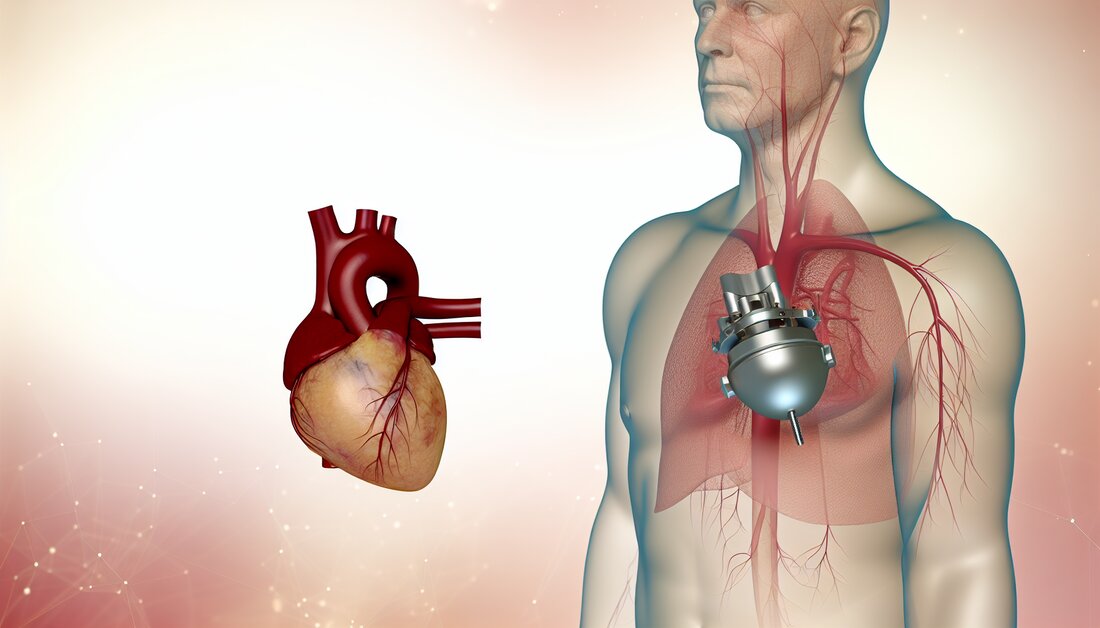Rare diagnosis: lymphoma associated with breast implants or pericardial effusion?
A 58-year-old woman presents a rare case of breast implant-associated ALCL with malignant pericardial effusion. Early detection is crucial. Symptoms: chest pain, fever, hemodynamics unstable.

Rare diagnosis: lymphoma associated with breast implants or pericardial effusion?
This research report describes a rare case of breast implant-associated anaplastic large cell lymphoma (BIA-ALCL), in which the disease initially presented with a malignant pericardial fluid collection (MPE). The patient, a 58-year-old woman, came to the hospital with symptoms including stabbing chest pain, fever and chills following the removal of her breast implants.
Clinical examination revealed signs of cardiac tamponade, a life-threatening situation in which the pericardium becomes dilated with excess fluid, hindering the normal heartbeat. Echocardiography confirmed a large fluid collection in the pericardium. After a multidisciplinary discussion, pericardiocentesis, a procedure that removes excess fluid, was performed. This provided immediate relief from symptoms.
Analysis of the fluid removed confirmed the diagnosis: BIA-ALCL, a rare type of lymphoma associated with breast implants. Treatment began immediately with a combination of the drugs brentuximab, cyclophosphamide, doxorubicin and prednisolone. This case highlights the importance of considering rare diseases when considering fluid buildup in the pericardium in patients with breast implants.
Potential future consequences or changes in past practices
The findings from this case could lead to increased awareness of BIA-ALCL in medical practice, especially in patients who have had or have breast implants. It may prompt greater attention to the symptoms of cardiac tamponade in these patients. In the future, doctors may consider lymphoma more likely to be the cause in women with breast implants and unexplained heart problems. This could lead to faster diagnosis and more effective treatment.
Basic terms and concepts
- Brustimplantat-assoziiertes anaplastisches großzelliges Lymphom (BIA-ALCL): Eine seltene Form von Lymphdrüsenkrebs, der mit Brustimplantaten in Verbindung steht.
- Bösartige Flüssigkeitsansammlung im Herzbeutel (MPE): Eine gefährliche Ansammlung von Krebszellen und Flüssigkeit im Herzbeutel, die den Herzschlag beeinträchtigen kann.
- Perikardiozentese: Ein medizinisches Verfahren zur Entfernung überschüssiger Flüssigkeit aus dem Herzbeutel.
- Herzbeuteltamponade: Eine medizinische Notfallsituation, bei der Flüssigkeit den Raum um das Herz herum füllt und so dessen Normalfunktion beeinträchtigt.
Abbreviations
- BIA-ALCL: Brustimplantat-assoziiertes anaplastisches großzelliges Lymphom
- MPE: Maligne Perikarderguss (bösartige Flüssigkeitsansammlung im Herzbeutel)
- CD30+, ALK-: Spezifische Marker, die bei Lymphomen nachgewiesen werden können
Malignant pericardial effusion as a rare initial manifestation of BIA-ALCL
The present study reports a rare occurrence of breast implant-associated anaplastic large cell lymphoma (BIA-ALCL), in which malignant pericardial effusion (MPE) served as the primary manifestation. The case involves a 58-year-old woman who presented with pleuritic chest pain, fever, and chills following the removal of her breast implants.
Clinical presentation and diagnosis
Clinical examination revealed jugular venous congestion, muffled heart sounds, and hemodynamic instability. An echocardiogram with Doppler confirmed a large pericardial effusion with tamponade physiology. During a multidisciplinary discussion, the decision was made to perform diagnostic and therapeutic pericardiocentesis, which provided immediate symptomatic relief.
Pericardial fluid cytology studies were performed, revealing CD30+ and ALK-ALCL, confirming the diagnosis of BIA-ALCL.
Therapy and meaning
Immediately after diagnosis, therapy with brentuximab in combination with cyclophosphamide, doxorubicin and prednisolone was started. This case highlights the rarity of MPE as an initial presentation of BIA-ALCL and highlights the importance of early detection and consideration of rare lymphomas in patients with breast implants.
Conclusion
The study shows the importance of considering BIA-ALCL in the differential diagnosis of MPE, especially in patients with breast implants.
The case also highlights the life-saving possibility of pericardiocentesis in cases of tamponade and the need for immediate oncological therapy after diagnosis.
For further details and the full study, please visit this link.

 Suche
Suche
 Mein Konto
Mein Konto
